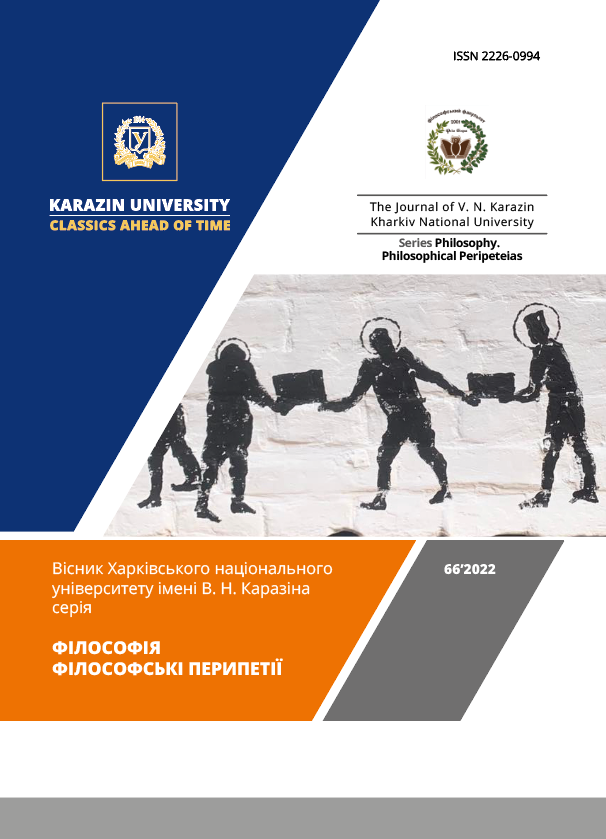MAN IN SOCIO-CULTURAL LIFE: BETWEEN SYSTEM AND ANTI-SYSTEM
Abstract
The anti-system is considered as a socio-cultural community of people whose worldview is built on the principle of denying and devaluing the existing reality and realizing the need to transform it. The real socio-cultural reality is threatened with destruction in order to implement the postulates of the anti-systemic doctrine, although this doctrine is contradictory and non-viable, and therefore its provisions cannot be implemented at the moment or at all. The reasons for the emergence of anti-systems are clarified: the crisis state of society (political and spiritual crises), the growing sense of deprivation and the presence of ideas and institutions that do not belong to the dominant culture in society. It is shown that intercultural interactions are a necessary condition for the formation of anti-systemic doctrines and organizations because in this process fragments of a foreign cultural picture of the world penetrate into society; fragments, which sometimes turn out to be incompatible with the local original culture. As soon as a part of people, who are usually intellectually developed and have a broad outlook, forms a syncretic, mosaic worldview from arbitrarily selected fragments of native and foreign cultures, the emergence of an anti-system becomes only a matter of time. It was found that a favourable environment for the emergence of anti-systems is pseudomorphosis as a state in which one society culturally and politically dominates another, imposing its forms and institutions on it, which are not compatible with the way of life of the recipient. As a result, all the creative forces of the host society turn out to be put at the service of supporting foreign political and cultural forms, which often leads to a sense of the meaninglessness of life and the injustice of the real socio-cultural reality. It is substantiated that in a state of deprivation on one side of the contradiction, there are certain expectations of the subject related to his needs, interests, beliefs, ideas, but on the other side of this contradiction are the real conditions for their satisfaction. It is noted that pseudomorphosis is an important factor for the formation of an antisystem, but the genesis of an antisystem can occur without it. It has been found that in the modern world, the anti-systemic potential is directly related to globalization, which made any ideas and doctrines available, encouraged millions of people to migrate to foreign lands, destroyed many cultural institutions that were in demand in autochthonous societies, and introduced foreign elements into the social environment foreign political-economic and socio-cultural standards, and therefore the modern world found itself in the grip of several anti-systems at once, unequal in strength and scale.
Downloads
References
Beilin, M.V. (2017). Processes of Globalization and the Planetary Life of a Human. In Contemporary Problems of the Development of Civilization and Culture: Proceedings of scientific articles. Ed. by N.V. Huseva. Ust-Kamenogorsk, Republic of Kazakhstan, pp.17-26. (In Russian).
Huntington, S. (1996). The Clash of Civilizations and the Remaking of World Order. New York: Simon & Schuster, 368 p.
Kumar, Kr. (2014). 'Time of Troubles': Arnold J. Toynbee's twentieth century. International Affairs. 90, 1, pp. 23-36.
Sorokin, P. (1985). Social and Cultural Dynamics: A Study of Change in Major Systems of Art, Truth, Ethics, Law and Social Relationships (Social Science Classics). Routledge, 720 p.
Spengler, O. (1991). The Decline of the West. New York: Oxford University Press, 414 p.
Toynbee, A. (1948). Civilization on Trial. London : Oxford University Press, 263 p.
Wallerstein, I. (2004). World-Systems Analysis: An Introduction. Durham, NC: Duke University Press, 128 p.
Zaman Asad (2022). Immanuel Wallerstein's Theory of the World System, Geopolitics and Geoculture. ENDLESS : International Journal of Future Studies. 5, 2, pp. 157–169. https://doi.org/10.54783/endlessjournal.v5i2.85
Citations
EXTREME VIOLENCE AND SELF-DEFENSE OF THE SUBJECT IN THE MODERN POLITICAL REALITY
Gazniuk Lidiia, Semenova Yuliia & Orlenko Olena (2025) The Journal of V. N. Karazin Kharkiv National University, Series "Philosophy. Philosophical Peripeteias"
Crossref
Copyright (c) 2022 Лідія Газнюк , Михайло Бейлін

This work is licensed under a Creative Commons Attribution 4.0 International License.
Authors who publish with this journal agree to the following terms:
- Authors retain copyright and grant the journal right of first publication of this work under the terms of a license Creative Commons Attribution License 4.0 International (CC BY 4.0).
- Authors are able to enter into separate, additional contractual arrangements for the non-exclusive distribution of the journal's published version of the work (e.g., post it to an institutional repository or publish it in a book), with an acknowledgement of its initial publication in this journal.
- Authors are permitted and encouraged to post their work online (e.g., in institutional repositories or on their website) prior to and during the submission process, as it can lead to productive exchanges, as well as earlier and greater citation of published work.






3.gif)




